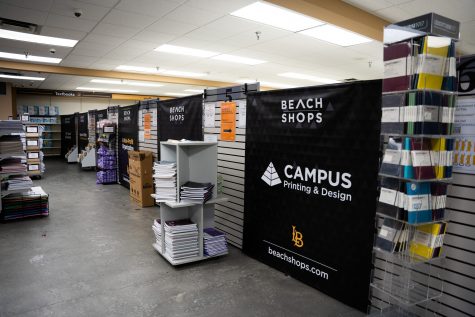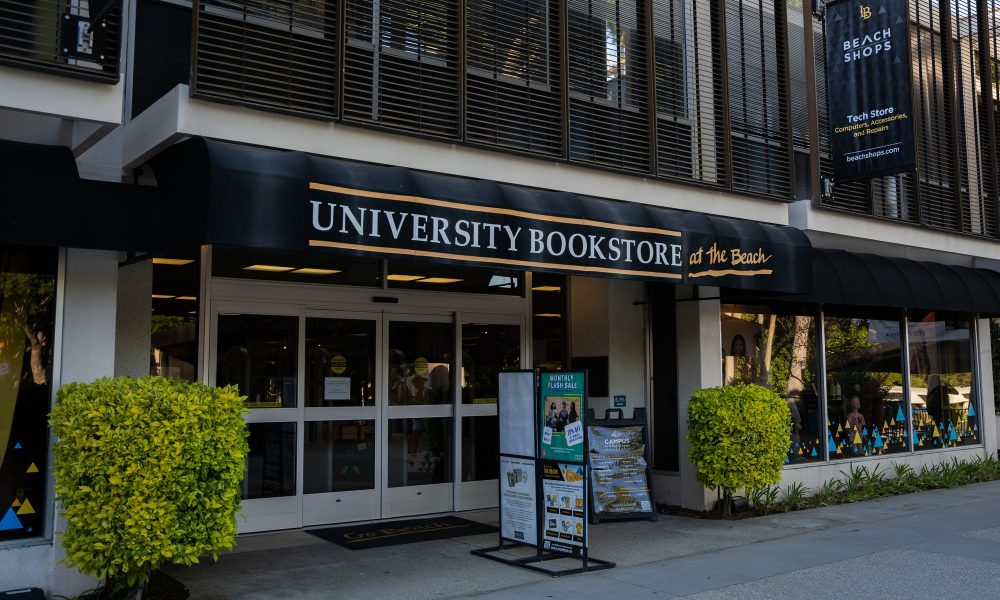By: Mark Siquig, Melody Ortiz and Lizbeth Cortes-Gutierrez
Beginning Fall 2024, CSULB will introduce the “Equitable Textbook Access” program, which will provide students with access to all their required textbooks at a flat rate of $250 for full-time students and $165 for part-time students per semester.
The program will offer instant access to all required textbooks digitally through Canvas. Participation will be optional, as students can opt-out by the last day to add or drop classes without approval.
The fully digital system was passed through an ASI resolution, which had a unanimous vote, as there has been a decline in physical textbook sales and rentals over the last couple of years. On the other hand, digital commissions have seen a rise.

The program was determined as the most effective approach to deliver affordable and accessible textbooks to students after consultation between Beach Shops and the university administration.
Cyndi Farrington, director of bookstore services, said that in classes where there is a digital book offered, approximately 80% of students are buying digital books and less than 8% are buying physical books.

“Because there has been a decline in people purchasing physical books, we’ve always looked for any way that we can save students money,” Farrington said.
This system was introduced to make it easier for students to access textbooks, make it more affordable by paying a flat rate and fight for sustainability. This effort would reduce the school’s carbon footprint by decreasing printing and shipping.
The digital system also makes it easier for students with disabilities while also cutting study time since it isn’t a physical textbook that you have to read.
“It’s a much better delivery for those who need accessibility through the Bob Murphy Access Center because a digital book can speak to you,” Farrington said. “If you have vision problems, that book can speak to you and we have students who maybe drive an hour each day back and forth to go to school, where they can listen to their textbook as opposed to two hours of extra studying a day.”
CSULB General Education Coordinator Danny Paskin believes that this change can benefit students if done correctly, calling it an interesting idea that will help students.
Paskin points out that students in engineering, business and natural sciences tend to spend a lot more money on textbooks every semester than other hands-on majors like journalism.

“I do not require my students to buy any books in any semester. I either give them suggested materials that they can buy if they want to,” Paskin said.
Amy Elise, an English rhetoric and composition major, shares similar thoughts with Paskin.
“I think it is a great option for specific majors,” Elise said. “STEM majors could save a lot of money with the new system, as textbooks are quite pricey for them.”
Elise said she usually gets her textbooks from Amazon, Chegg or Textbooks.com. This semester, she said she spent about $130 for all nine of her required textbooks.
While Paskin believes there are some benefits, he is concerned about books that aren’t available in digital forms, such as some of the books from the English Department.
“Now you’re telling me that either I can’t require those books because they’re not digital or my students are going to be paying those 250 bucks. But then on top of that, are still going to be required, by me, to buy that extra 20 bucks for this book,” Paskin said.
While digital textbooks will be a major change for the university, Vice President of the Academic Senate and English Professor Neil Hultgren has his worries.
“For someone who spends a lot of time teaching students to pay attention to text, to analyze passages, to focus their thinking in a certain way, it becomes difficult to do that if say someone is reading an 800-page novel on their iPhone,” Hultgren said.
Beach Shops is launching an awareness campaign in Spring 2024 to provide ample time to engage with all campus constituents.




